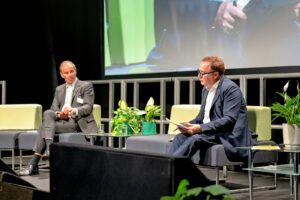Insights from the day
Derek Provan, President of the Glasgow Chamber of Commerce, started the morning with a quote from Aristotle: “What happens when an unstoppable force meets an immovable object?” It certainly set the tone for the day, clearly laying out that something has to change if we want to actually see change. He emphasised the need to move beyond strategy and commitment highlighting how important is that we act decisively.
Sarah Howard MBE, Chair of the British Chamber of Commerce, spoke on the importance of SMEs in the UK economy. Making up 99.9% of UK private sector businesses, SMEs are “the change makers and risktakers” and play a critical role in the circular economy and the fight against climate change. “Businesses sit at the heart of the solution” and as members of the SME community, we have a real opportunity to effect change.
James Close, Head of Climate Change at NatWest Group, presented a sobering reality: 75% of scientists believe we will exceed the 2-degree global warming threshold. This is influenced no doubt by the decline in global circularity rates (according to the Circularity Gap Reporting Initiative, the use of secondary materials has reduced from 9.1% in 2018 to 7.2% in 2023). He called for urgent action, prioritising pace over perfection.





